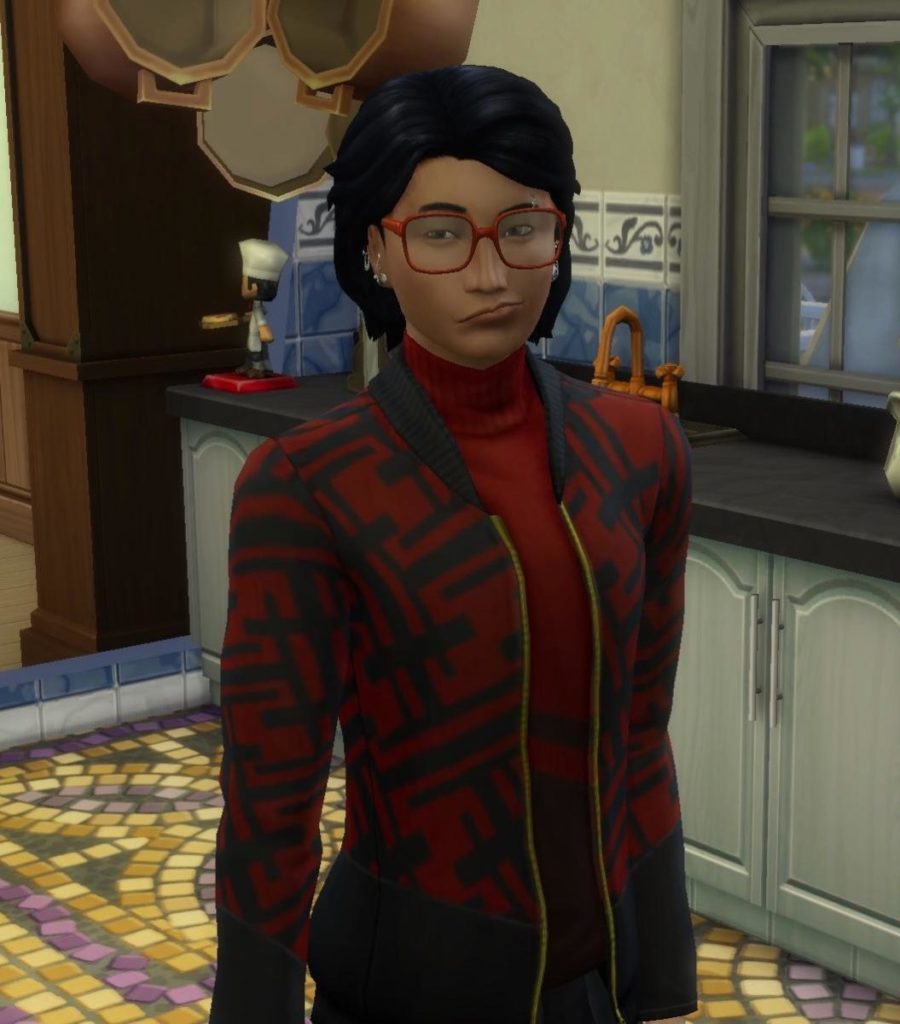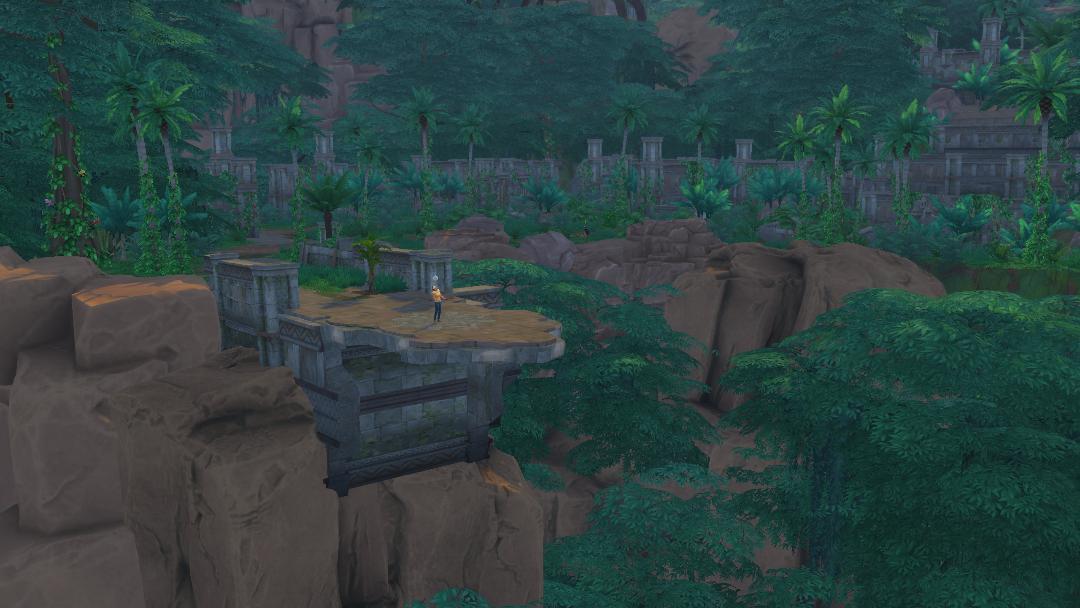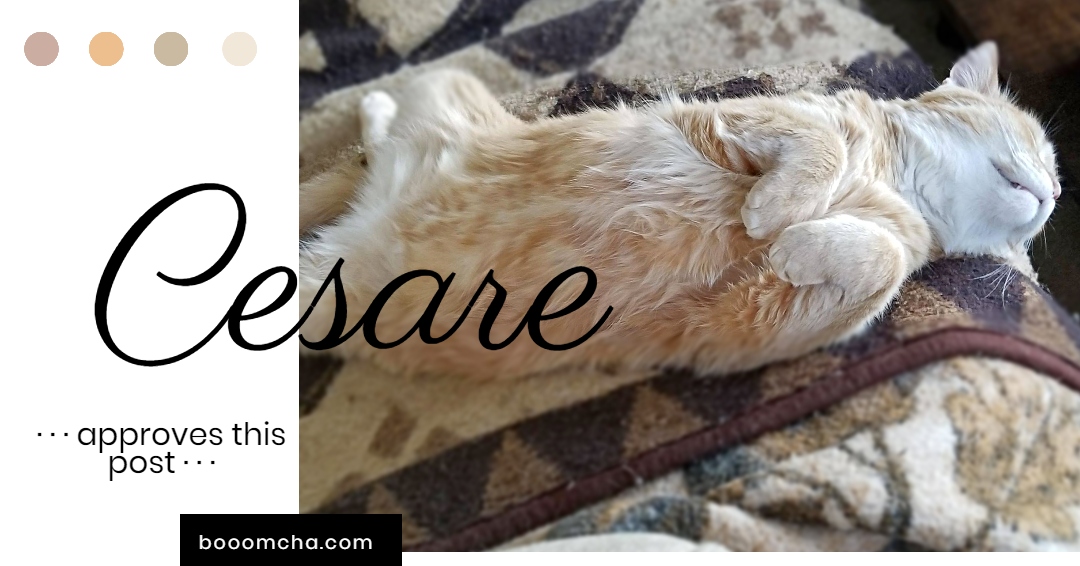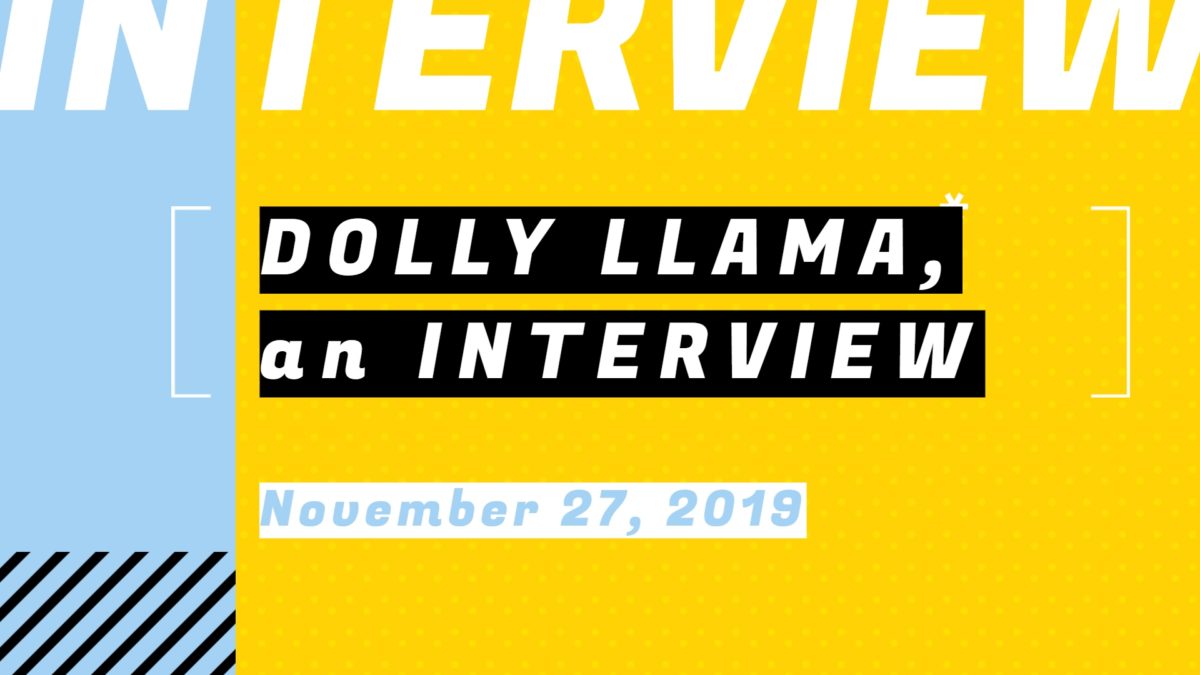Happy time zones, Friends! Today, we’re in for a real treat! Dolly Llama, the author of Catastrophe Theory has provided us with a very thoughtful interview!
Catastrophe Theory is a black comedy-drama about existential pain and people making terrible choices. Sounds good, doesn’t it?
Okay, Dolly Llama, take it away!
1. How long have you been playing The Sims and what got you into it?
Definitely since the first one came out. I don’t quite remember why. What I do remember is making a family of four and my stepdad telling me he knew my family had kids because ‘his family sells drugs to kids.’ My stepdad was a jerk.
I can say for sure what kept me in the game: my childhood friend and coauthor Simister. This woman is a genius when it comes to messing with videogames. When she was twelve, she used Zoo Tycoon to make a zoo with but one exhibit: a jungle with 99 chimps and 1 leopard. She named it ‘Evolution.’ She uses The Sims to set up elaborate scenarios like trapping a little boy in a glass room with a violin, where his grandmother sits on a viewing bench and watch him to make sure he didn’t do anything but play the violin. She had so much CC, she could make a Sim that was just a floating globe in a bonnet and another that was just a stick and have them coparent a child together. She’s a bona fide chaotic neutral genius.
2. Why did you begin blogging your sims story?
Because Simister wanted me to. I had quite a bit written up that I considered too rough to share with the world, but she convinced me. It’s clear from looking at the post history which one of us is more invested.
3. How do you come up with your story ideas?
Idk.
Let me clarify. For this particular work, this question needs a prerequisite: do you come up with your own story ideas in the first place? Like many other SimLits, the answer is yes and no. I chose this genre because it’s a unique (to my knowledge) form of fiction where the characters can act without being influenced by the author. But since the will of the devs is to have player control be front and center with no threat of simulacratic revolt, there’s also this weird paradox where I have to project my own flawed understanding of the characters in order to act as them or else the story goes nowhere. It’s a balancing act.
I do construct the stories to follow several overarching themes. In the spirit of metafiction, they’re mostly different variations of ‘no one has any idea what’s going on and we’re not going to pretend that we do.’ Philosophical paradoxes show up as throwaway lines even in the weaker early chapters. Yet another theme, which is both central and won’t show up after 40 chapters, is exploring the implications of living in a world where death is avoidable. It’s outwardly about 12+ garbage disasters imploding in 12+ different ways, but it lives and dies on the strength of its ideas.
So to answer the original question, it’s different for every chapter and I have no idea. Welcome to Catastrophe Theory.
4. Do your sims’ actions help create new ideas or make the story go in a different direction than you had intended?
See above.
5. Which character is your favorite and why?
Let me start by putting this in perspective. Early on (regardless! Spoilers!), Xiyuan Liu, a middle-aged man with a wife and child, autonomously realizes he’s been living in the closet. Then he goes to a routine hangout with his best friend and tries to hit on the dude. Again, autonomously. Then, eventually, he goes to a bar and, I swear on my life, used the fraction of a minute I left to get my tea to start chatting up Lord Bernard Shallot Escargot III.

Xiyuan is a posh shut-in artist who can’t relate to anyone in his world. What he seemed to know, and what I didn’t, is that Bernard is inarguably his soulmate. So he stumbled into this astounding Gothic love story about two eccentric misfits who transcended death and time to be together, and it’s something I as the player never would have imagined in Bernard’s lifetime.
Xiyuan is not my favorite Sim. His son Shu is.

I’ll leave it to you to speculate how awesome Shu must be.
6. What chapter has been the most difficult to write so far, and why?
‘Guide Me, North Star’ and ‘Al Mal Tiempo, Buena Cara.’
More on this in the next section, but there’s an odd progression of style in CT that wouldn’t fly in a novel. The first dozen chapters, published mostly in March, are silly first-person descriptions of gameplay. Later on, the first person narrative dies an honorable death and we get more into the character’s heads. Later still, the characters get extensive dialogue and I explain almost nothing except when it’s funny to bluntly lampshade it in a photo caption.
‘Guide Me, North Star’ was difficult to write because it’s the turning point where the Sims get a voice. It’s also stuffed with jokes I’d been waiting to deploy since day one. Even though my writing’s gotten better, I still consider it my masterpiece.

‘Al Mal Tiempo, Buena Cara‘ was a nightmare to execute. I had no idea what the plot would be like before gameplay, but knew I wanted to write a reflective chapter that took inspiration from Sandra Cisneros. Every line of dialogue spoken by Claudia had to be translated into Spanish to make sure her word choices and phraseology made sense for a native Spanish speaker (which I’m not). To write the relationships showcased in this chapter, I read Why Does He Do That? by Lundy Bancroft, a book about abusive spouses, multiple times. So, yeah. Nightmare to execute.
7. Is there anything you wish were different about your story?
It has two main weaknesses: there’s an unsettling stylistic shift between early chapters and later ones, and I have no idea how to take screenshots.
One thing I like about the blogging format, and SimLit in general, is the oblate honesty about the writing process. In a novel, the beginning has to be one of the strongest parts. But on a blog, the beginning is usually one of the weakest, having been written first. This is certainly true of the blunt tell-don’t-show portion of CT that was written before it went public. Unfortunately, unless a new reader skips ahead to one of the later chapters first, they have no idea what to expect.
The reason I’m leaving the early posts as-is, despite losing credibility and possibly readers, is to highlight how my own style has developed with the story. I’d rather show vulnerability than pretend I started off writing like this. But, I won’t lie here, it stings when the stats show a reader giving up after the first chapter.
As for the screenshots? I’m just not a visual person. I’m still trying to pin down the basics and don’t do as much studying as I should.
8. Do you have advice for any writers who are starting out?
Let me pull up screenshot of a tumblr post to use as an epigraph.

– This applies to writing too. Other people’s talent does not diminish your own. Other people’s talent does not diminish your own. Creativity can’t be measured. Success can’t be predicted. If your writing provokes someone else into an emotional response, be proud of what you’ve made. Humility isn’t prostrating yourself over every perceived shortcoming. Humility is judging yourself the same way you judge others.
– Get a usage dictionary. If you want to break the rules, you’re better off knowing what they are first. It frees you to play around quite a bit. Prescriptivists get a bad rap for being jerk buttfaces whose eyes twitch at every plural possessive with a misplaced apostrophe and get worked up into a fit of nerd hysteria over whether who else’s or whose else is correct (people this is an actual conversation I had yesterday), but some “rules” are actually superstitions (starting a sentence with ‘because’), and some are enforced because breaking them will annoy or confuse your readers (is a ‘black cat collar’ a collar for a black cat, or a cat collar that happens to be black?). Also, English has many non-standard recognized dialects; using phrases like ‘How you doing?’ is completely acceptable in creative writing and often helps your dialogue or narration sound less wooden.
– It’s okay to not take writing advice from someone who doesn’t respect you. It’s possible that some of the things they say may be true, but is it really worth the effort to pick out which ones? You don’t have to sift through feces for gold. If it’s a real problem, the people you can trust will come up with it independently anyway.
– And lastly, give yourself and other people a break for experimenting. Everyone’s going to be cliche or drop solecisms or “try to sound too clever” at some point.
9. What are the challenges of bringing your characters to life?
Sweet Mother Earth, the dialogue.
Every character speaks differently. I don’t just mean because their personalities and bodies of knowledge are different, every single one has different preferred sentence structures, levels of formality, subdialects, colloquialisms—and yes, they all style-shift in different contexts. Take Shu for example. He grew up with two highly educated and eloquent parents, and is himself very talented and educated, but his dialogue is staccato, vulgar, and unpretentious. You get the sense of a character who’s trying to reject his upbringing while inadvertently reaping its benefits. Worse, being a highly empathetic and socially aware person means his choices shift depending on who he’s talking to: he ups the formality around his parents, reduces/abrogates profanity around children, and generally mirrors the speech patterns of his conversational partner while still sounding like himself.

Charlie’s brilliant, but he speaks like a modern postgraduate-educated person, not the ersatz Fictional-Smart-Guy stuffy formal dialect that makes him sound like an eighteenth century aristocrat. Bernard does because that’s what he is. Kendra is basically a more level-headed Simister. Xiyuan knows what ‘grandiloquent’ means and he’s not afraid to bust it out in casual conversation. Claudia you know about already. This applies to writing, too: Jo, Kendra and Aileen are not only all at different levels of writing ability, they each have a different focus.
10. Would you like to share an excerpt from your story or a summary of your story? Or both?
YES!
Just to prove I can write short things, let’s start off with one of Claudia’s lines from ‘Al Mal Tiempo, Buena Cara:’

Ah, Madre, she thought, you wasted a miracle on a woman whose life was full of them.
From ‘Guide Me, North Star,’ which has a dozen other passages equally worthy of being here:
Jasper had already learned the seven dirty words (plus others. He’s also restricting himself to Simlish here) by getting past the parental controls 30 minutes after he aged up. For someone who was just beginning to develop his own system of ethics, the concept of certain words being powerful enough to send his mother into a fit of disproportionate rage was the most compelling idea he’d been exposed to in his 20 hours of childhood. That those seven words had such emotional gravitas compared to, say, Mom’s suggestions of cat/gato/猫/고양이 or dog/perro/狗/개, e.g., elevated them to the position of highest importance in his growing mind. And now, from overhearing her warning, he knew to correctly view Shu as a modern-day Shakespeare in that his written work singlehandedly extended the vulgar lexicon by several increasingly elaborate and obscene turns of phrase. Jasper at last felt his thirst for knowledge outweigh his desire for material goods; the universe had sent his guru in the mountains, his Brahmachari. There would be rumors a century later that Jasi received his side-splitting neologisms from on high, Moses-style, but you can’t see the evidence because one of his acolytes let it get, I don’t know, eaten by ants or something.
From ‘Option 3,’ which is vulnerable and emotional:

That’s the other half of why Aileen’s house is empty so often. Some information can’t be communicated by talking, or at all, because it has to be realized by each person individually. Often these are the simplest statements. Be yourself. Empty, until the person who the command is directed at understands what that means. It can take years to know what that means, to be yourself. Understanding that you’re going to die—not intellectually, actually coming to terms with your own death—no matter how knowledgable or virtuous one’s life was, is another such bit of information. Aileen knew her friends weren’t ready to hear that. She didn’t need to remind them that for someone who didn’t believe in reincarnation, the only easy way out was a hard restart, and if she tried that, she wasn’t coming back. She was the unresolvable problem, and she was Putting People Down.
Of course I have to include ‘Vignettes from San Myshuno:’
“What can I say? I’ve always had a good eye.” Bernard rolled his. “Before that night, I spent years searching for someone who experienced feelings as deeply as I do, who considered my obsessiveness to be a profound source of connection, not as something to merely tolerate. I found no one. I came to believe that there was, indeed, no one capable of truly relating to me. I learned to acclimate to the constant feeling that something was incomplete. But it never occurred to me,” he continued, “that the person I was looking for may have died almost a century before I was born.”

Lastly, if you don’t have time to read a story with a nearly-six-digit word count, I made a tumblr (dollyllama108.tumblr.com) to share short quotes and occasionally also post silly gameplay extras.
Despite being 90% jokes, CT manages to be bleak as all hell and getting worse. It’s easy to get the impression that the core message is nihilistic. It isn’t. The name Catastrophe Theory comes from a branch of mathematics where disorder is not only accepted, but studied and quantified. Maybe we don’t have all the answers, but we don’t need all the answers. Sometimes we’re going through hard times and just need to know someone else gets it. That’s who the story is written for.
Wow! This was such an awesome interview! I’m so happy we did this Q&A! Thank you so much, Dolly Llama!
Did you all enjoy this interview as much as I did? I hope you will check out Dolly Llama’s story soon because it truly is a top-notch read!

If you are a blog author (it does not have to be The Sims related) and would like to be featured in an interview, please send me an email using my contact form! I would love to interview you, too!
For those who celebrate, Happy Thanksgiving!

Thank you for reading,


Discover more from Kymber @booomcha.com
Subscribe to get the latest posts sent to your email.



Oh man, this interview was exactly what I needed to read. I enjoyed it thoroughly and it’s real treat getting into someone’s thought process 🙂
Thank you so much. ❤️ I’m so glad this interview could brighten your day. Dolly Llama is amazing!
I enjoyed getting to know you a bit deeper DollyLlama .. it is always fascinating to see into the the creative mind of another scribbler and especially one who is quite different form me <3 ! TY sweet Kymber for spotlighting her for us.
Thank you, Lisa. I truly enjoyed this interview with Dolly. She is a deep thinker, and a wonderful, creative writer.
Great interview! Even though I haven’t read much of CT, I really love the parts I did read and by reading her work, it’s evident that Dolly is a brilliant writer.
Thank you so much. I’ve been away for a long while due to illness, but am now finally able to catch up on comments. Thank you again for leaving such a nice, and encouraging comment. Dolly is an awesome writer, for sure! xo
You’re welcome! Hope you feel better now! 🙂
Thank you so much. I really do. 🙂
Wow, this is an amazing interview! I love your answer, Dolly Llama, to coming up with story ideas. “It’s outwardly about 12+ garbage disasters imploding in 12+ different ways, but it lives and dies on the strength of its ideas”. I think you’re hugely talented, you and Kymber, for creating the stories, making the characters three dimensional & getting all the graphics done so well! 😄
Caz xx
Thank you, Caz! xo I’m glad you enjoyed the interview. I loved Dolly Llama’s answers. She is such a good writer.
Thank you, Kymber and Dolly Llama!
You chose my too favorite chapters. Those were really emotionally challenging for me to read, and diving into the challenge brought rewards I’m still drawing on.
I love that blogs allow us to see the writing process develop in ways that non-serial published writing doesn’t.
Kymber, you left out the most crucial question: where’s Charlie?
I’ve had some trouble commenting up until now. A huge thanks to Kymber! And I couldn’t ask for a better reader than Cathy Tea—it means the world that someone else can draw such meaning from my stories.
(Charlie’s alive. That’s all I’ll say.)
@Dolly LLama Thank YOU! It was so nice of you to answer all my nosy questions. lol I love the depth of your answers, and your writing is so, so good.
@CT Doh! I should have asked that! 😀